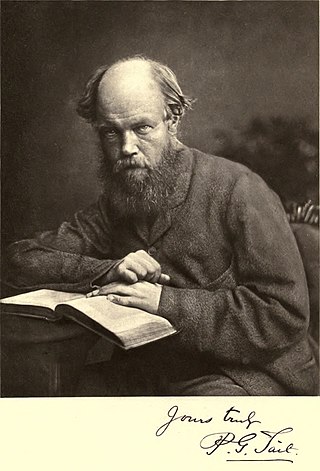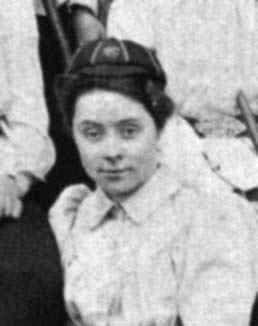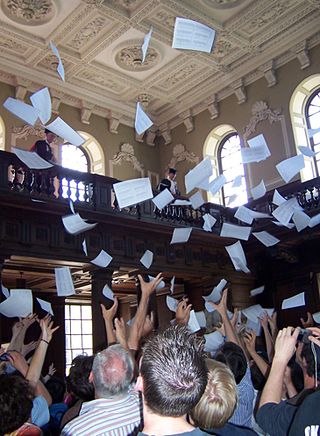Related Research Articles

Peter Guthrie Tait was a Scottish mathematical physicist and early pioneer in thermodynamics. He is best known for the mathematical physics textbook Treatise on Natural Philosophy, which he co-wrote with Lord Kelvin, and his early investigations into knot theory.

William Hopkins FRS was an English mathematician and geologist. He is famous as a private tutor of aspiring undergraduate Cambridge mathematicians, earning him the sobriquet the "senior-wrangler maker."

At the University of Cambridge in England, a "Wrangler" is a student who gains first-class honours in the final year of the university's degree in mathematics. The highest-scoring student is the Senior Wrangler, the second highest is the Second Wrangler, and so on. By contrast, the person who achieves the lowest exam marks while still earning a third-class honours degree is known as the wooden spoon.

Philippa Garrett Fawcett was an English mathematician and educationalist. She was the first woman to obtain the top score in the Cambridge Mathematical Tripos exams. She taught at Newnham College, Cambridge, and at the normal school in Johannesburg, and she became an administrator for the London County Council.
A wooden spoon is an award that is given to an individual or team that has come last in a competition. Examples range from the academic to sporting and more frivolous events. The term is of British origin and has spread to other English-speaking countries. In most cases it is simply a colloquial term for coming last – there is no actual award given.

Edward John Routh was an English mathematician, noted as the outstanding coach of students preparing for the Mathematical Tripos examination of the University of Cambridge in its heyday in the middle of the nineteenth century. He also did much to systematise the mathematical theory of mechanics and created several ideas critical to the development of modern control systems theory.

The Mathematical Tripos is the mathematics course that is taught in the Faculty of Mathematics at the University of Cambridge. It is the oldest Tripos examined at the university.

William James Stirling was a physicist who served as the first Provost of Imperial College London. He was appointed to this role in August 2013 and retired in August 2018.

Sir Charles Edward Inglis, was a British civil engineer. The son of a medical doctor, he was educated at Cheltenham College and won a scholarship to King's College, Cambridge, where he would later forge a career as an academic. Inglis spent a two-year period with the engineering firm run by John Wolfe-Barry before he returned to King's College as a lecturer. Working with Professors James Alfred Ewing and Bertram Hopkinson, he made several important studies into the effects of vibration on structures and defects on the strength of plate steel.

The Senior Wrangler is the top mathematics undergraduate at the University of Cambridge in England, a position which has been described as "the greatest intellectual achievement attainable in Britain".
John Law (1745–1810) was an English mathematician and clergyman who began his career as a Fellow of Christ's College, Cambridge, and went on to become chaplain to the Lord Lieutenant of Ireland and Church of Ireland bishop of Clonfert and Kilmacduagh (1782–1787), Killala and Achonry (1787–1795), and finally of Elphin (1795–1810).
John Blissard was a Church of England vicar, educator, and mathematician who invented what came to be known as the umbral calculus. Although he never held a university post, Blissard was an active mathematician, especially during the 1860s when he was in his late fifties and early sixties. He published mostly in the Cambridge-based Quarterly Journal of Pure and Applied Mathematics.
Thomas Gaskin (1810–1887) was an English clergyman and academic, now known for contributions to mathematics.
William Henry Besant was a British mathematician, brother of novelist Walter Besant. Another brother, Frank, was the husband of Annie Besant.
Robert Rumsey Webb, known as R. R. Webb, was a successful coach for the Cambridge Mathematical Tripos. Webb coached 100 students to place in the top ten wranglers from 1865 to 1909, a record second only to Edward Routh.
Robert Alfred Herman (1861–1927) was a fellow of Trinity College, Cambridge, who coached many students to a high wrangler rank in the Cambridge Mathematical Tripos. Herman was senior wrangler in 1882.
Robert William Genese was an Irish mathematician whose career was spent in Wales.
Sheila May Edmonds was a British mathematician, a Lecturer at the University of Cambridge, and Vice-Principal of Newnham College from 1960 to 1981.

Charles Niven (1845–1923) was a Scottish mathematician and physicist who spent most of his career at the University of Aberdeen. He published on mechanics, electricity, and heat.

James Porter was a British academic in the second half of the 19th century.
References
- ↑ Full text of Alumni cantabrigienses; a biographical list of all known students, graduates and holders of office at the University of Cambridge, from the earliest times to 1900
- ↑ Introduction to the Campbell Allen Papers
- ↑ University of Chester 1839-2012: The Bright Star in the Present Prospect By Ian Dunn, p. 18